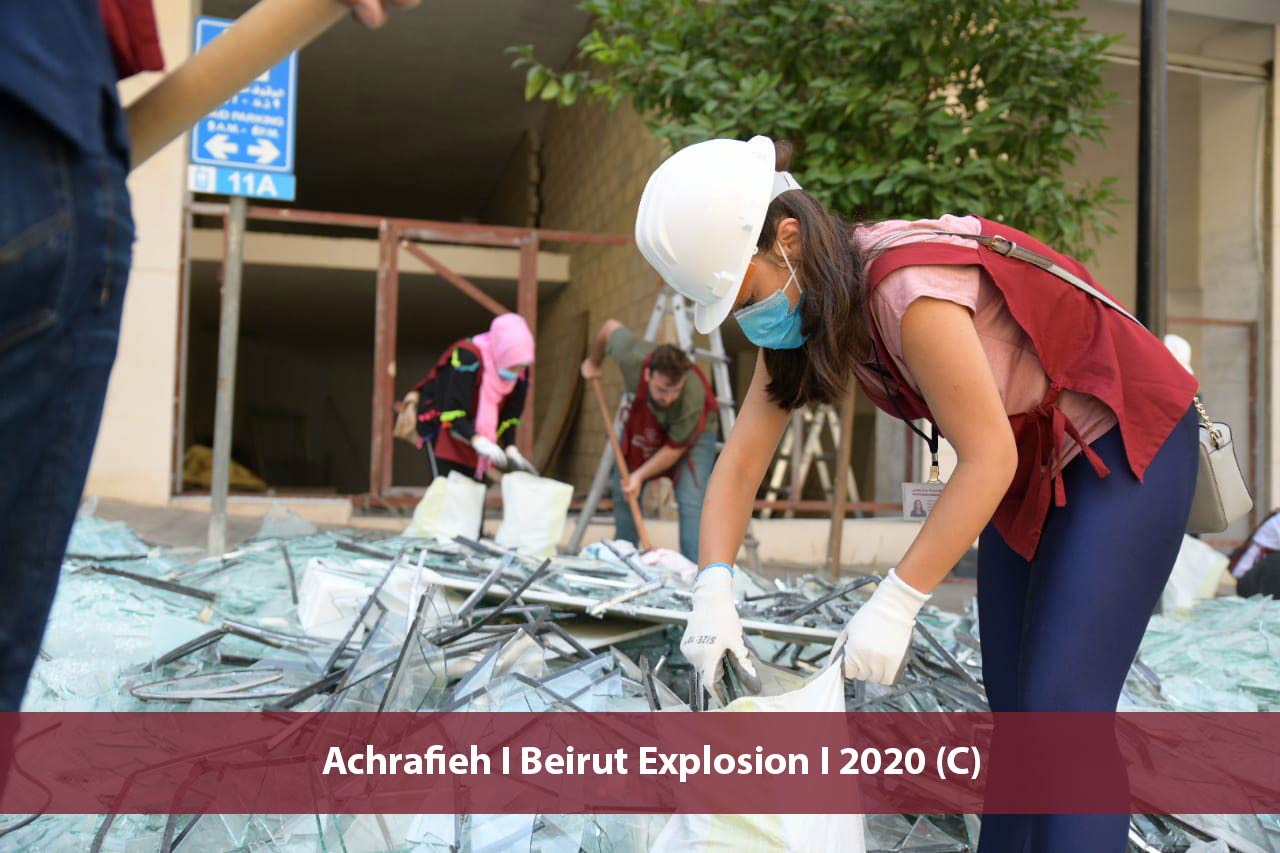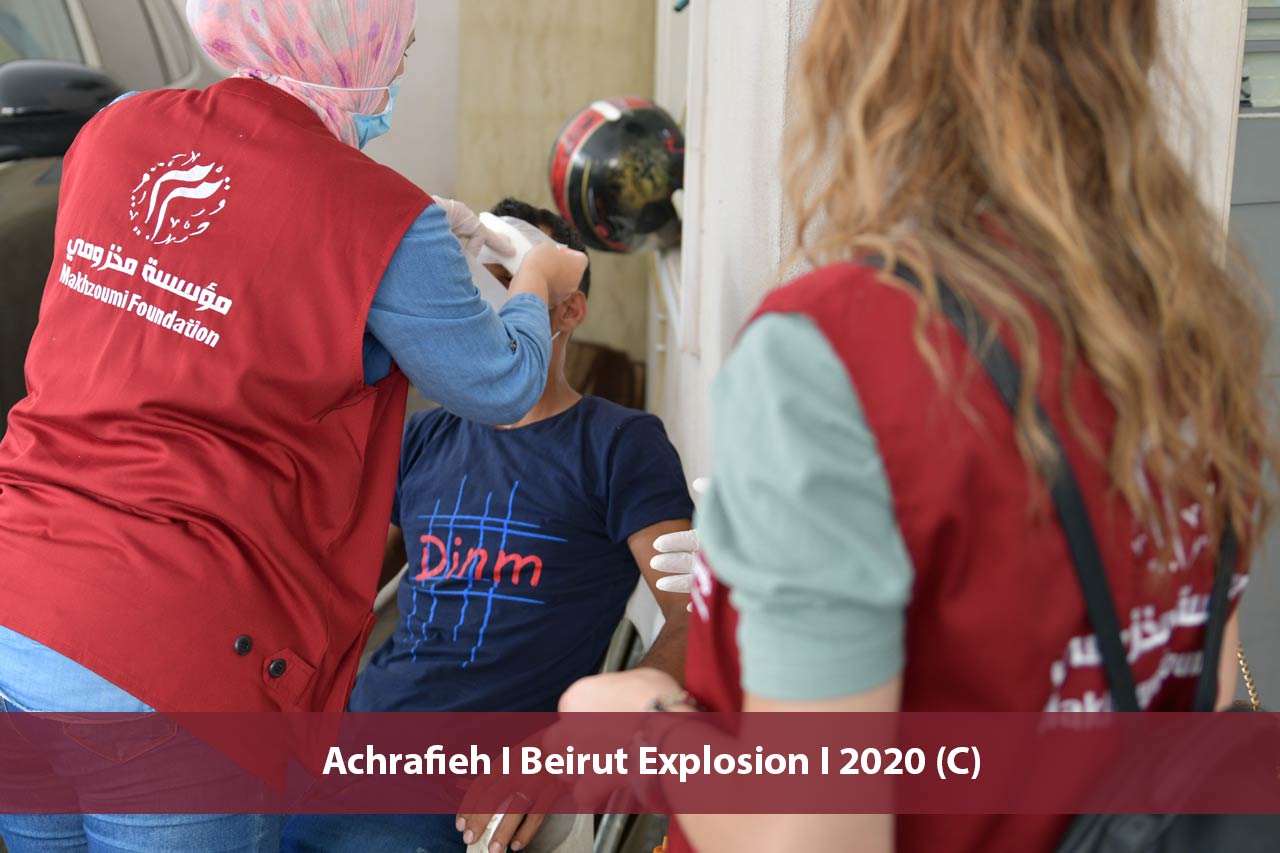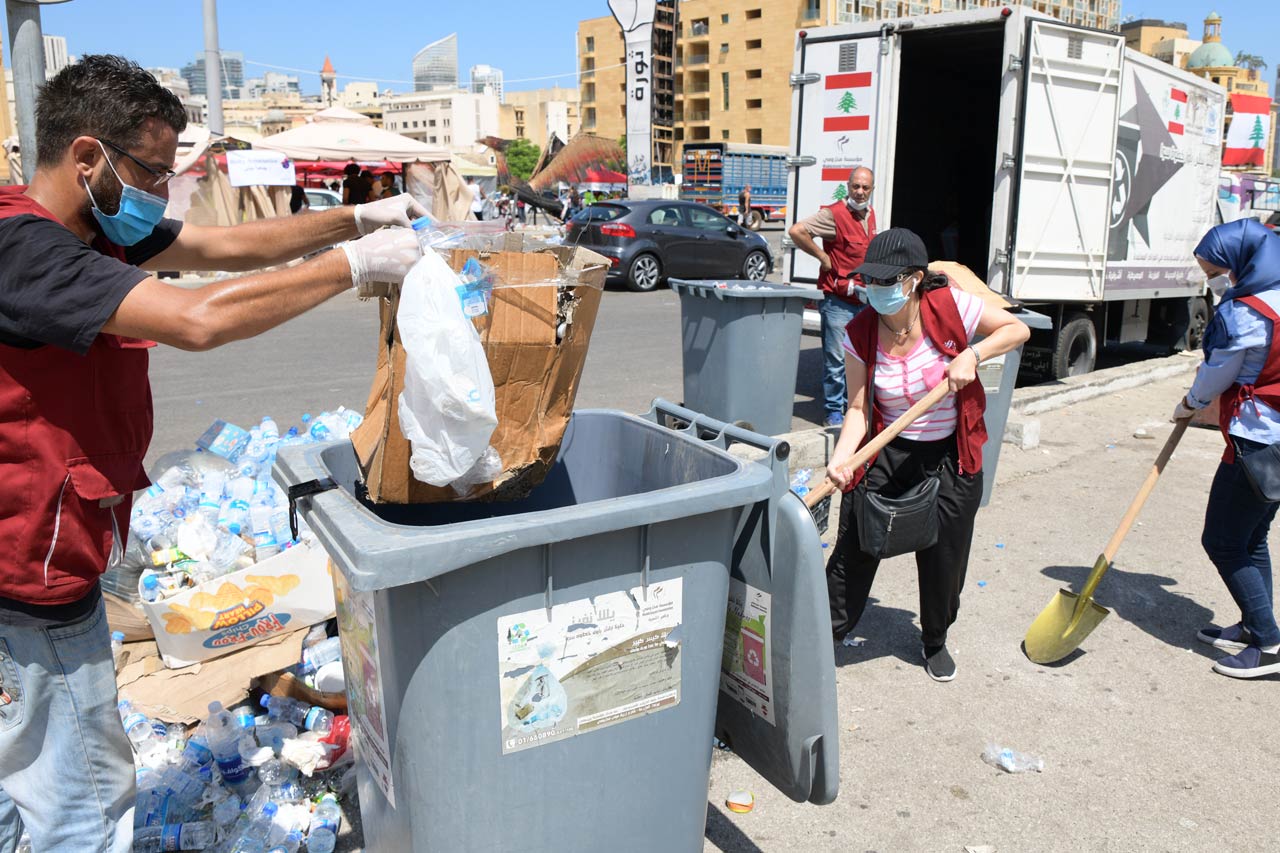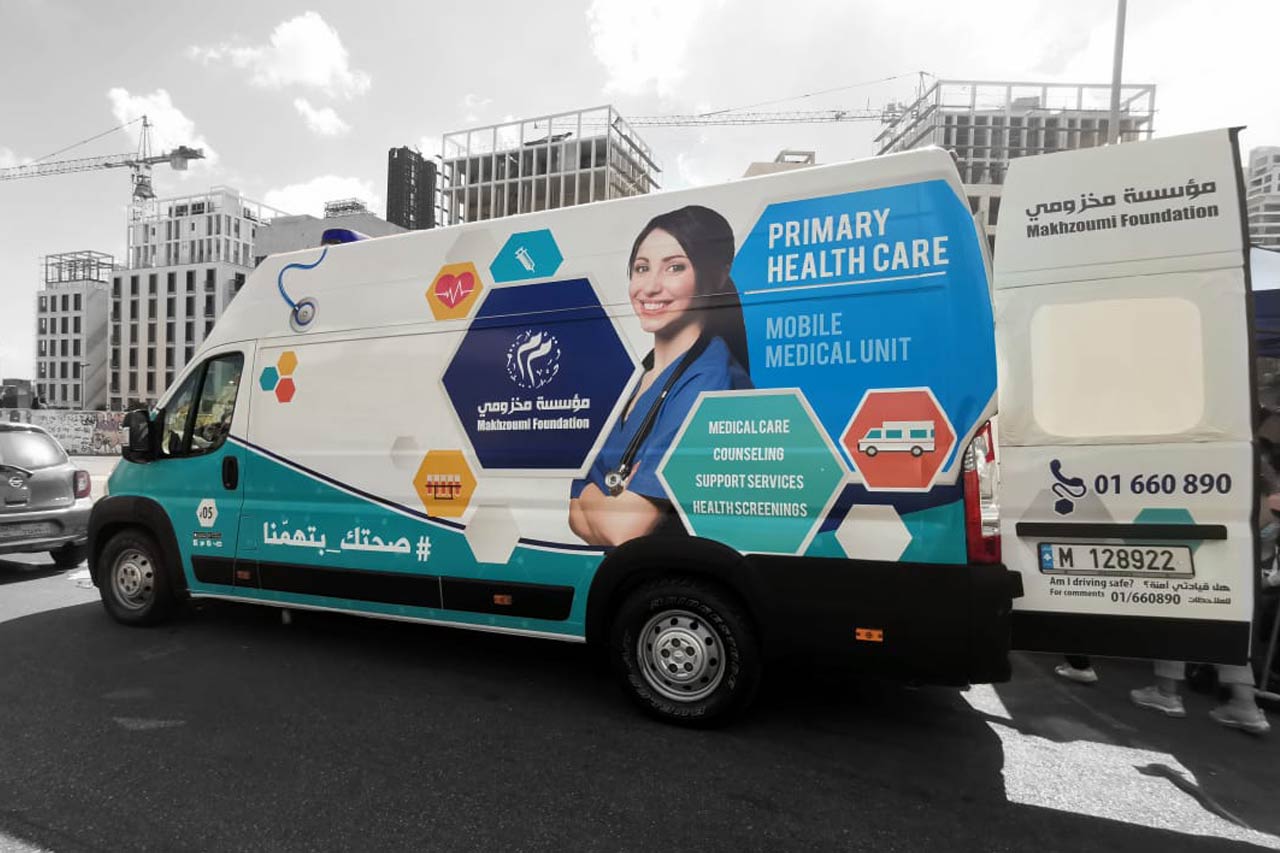
- A deadly explosion on August 4, 2020 struck Beirut port.
- The explosion was felt as far as 15 kilometres away.
- $15 billion worth of damage.
- A state of emergency is declared for a period of 2 weeks.
- Families have been forced to seek temporary shelter at schools,
- acquaintances and administrative buildings.
- This comes on top of the very significant effects of the economic crisis and the COVID-19 pandemic.
MAKHZOUMI FOUNDATION’S RESPONSE
Despite
the heavy hit over Makhzoumi Foundation premises in Beirut, all its teams stayed fully
functional based on guidance by the Founder, M P Fouad Makhzoumi, and the President, Mrs May Makhzoumi The instant the explosion eroded, the Safety and Emergency committee called for an emergency consultation to set the action plan An operation room to manage the crisis was set in place in the midst of Beirut standing by for 24 7 All staff and volunteers were mobilized according to the crisis response Plan Several hotlines were promptly activated based on the emergency needs The hotline for the PSS was held active through the healthcare team The hotline for the call for volunteers also was held active by the volunteers unit, and the general support hotline was operating in the field for people requesting urgent help in removing glass and cleaning Makhzoumi Foundation s priority was the wellbeing and safety of its community This was realized through providing a multi sectoral response focusing on Health, NFIs, WASH, Shelter, Protection and
Volunteering The Continuity of COVID 19 response activities was also an emphasis going in parallel

Current discussions are taking place hourly with stakeholders to determine the most urgent needs and potential response options.
ACTIONS TAKEN
Makhzoumi Foundation Rapid Response focused on 6 main points:

HEALTH
As early as the explosion hit Beirut, the medical teams of Makhzoumi Foundation went to the ground. Physicians and nurses trained on first-aid procedures went inside the MMU and started roaming the roads in the blast area and the surrounding damaged streets. The emergency team was still in action after 70 days of the sad advent. Mazraa PHC, our main center, was open for all medical services: Medical consultations were offered for free by all specialties under the Beirut Explosion MF Fund, laboratory and radiology tests were done for every affected individual who sought help in the PHC, and essential medications were distributed with the support of the MOPH and UNICEF. The PHC was receiving external referrals of cases from other organizations working in the field. All health services were done in direct coordination with the health partners including mainly MOPH, YMCA, UNHCR, and UNICEF. Internal referrals by MF Relief unit were also taking place continuously, serving the refugees in the midst of this crisis. Despite the emergency situation, routine vaccination did not stop. The health and safety of children remained a priority. One to one Infant and Young Child Feeding (IYCF) counseling for pregnant and lactating women was taking place whenever needed in the breastfeeding room at the PHC in Mazraa. The Non-Communicable diseases program (NCD) continued to screen all people for cardiovascular diseases including people who are directly affected by the explosion. Makhzoumi Foundation PHC was also hit severely by the explosion shockwaves. Assessment was being done currently on its infrastructure by the MOPH and Relief International. Initial results confirmed some structural damages to the health facilities and the building where it was located. Most of the damage was dealt with immediately by MF logistics and maintenance teams. Rooms that were not eligible for functioning were relocated immediately to other floors. The Ministry of Public Health and UNICEF were procuring medical kits, medications and supplies.
NFIs and WASH
Makhzoumi Foundation with its partners have assessed 1300 homes for damages in water pipes and connections in an aim to work for interventions with WASH partners Homes accessibility was difficult on the first days after the explosion Water systems were damaged,and tanks needed repair or replacement Makhzoumi Foundation distributed 1780 hygiene kits and IPC materials to the most needy families in Bashoura, and Karantina In addition to continuous distributions at MF PHC in Mazraa The distribution was done in partnership with MOPH, UNICEF, Arcenciel, LRC, and World Vision Distribution of household items and essential electronics also was taking place in the affected areas based on the Rapid Impact Assessment done by Makhzoumi Foundation field surveyors in collaboration with its partners


PROTECTION
During the explosion, Makhzoumi Foundation Protection sector built on its experiences and its resources from previous crises, since 2006 starting with the Israeli bombardment of Lebanon, to the Iraqi and Syrian wars, to the forest fires in Mount Lebanon, and now to the Covid 19 pandemic By liaising with the office of Beirut Governor, UNHCR, the Ministry of Public health and the Municipality of Bourj Hammoud, teams were coordinating the response at the field level Priority was addressing mainly outreach, community engagement, psychological first aid ( and referrals to Psycho Social Support ( Protection services are provided by specialized outreach teams and teams located in MF relief unit inside Hariri hospital and in PHC in Mazraa Both the MMU and the Fun Bus were touring the affected areas to provide protection services on a daily basis Social animation through the Fun Bus team in the field helped children who were traumatized because of the explosion The psycho social support hotline on 70793038 was also mobilized for emergency cases

SHELTER
Makhzoumi Foundation response had been continuously based on its home to home assessments for determination of eligibility for assistance To support with access to the affected areas in Beirut ground zero and the affected surroundings, teams were liaising with partners, local authorities, and volunteers to provide shelter assistance in Saifi, Geitawi, Mar Mkhayel, Gemayze, and Karantina The Multi Sectorial Needs Assessment of communities affected by Beirut Explosion The Multi Sectorial Needs Assessment of Communities affected by Beirut Explosion developed by MF emergency task force, was immediately used as a tool for the assessment of the explosion s impact It was a flexible,
transparent and a permanent record that was helping for further interventions, discussed earlier in this report The teams did 1353 baseline surveys, in House to House visits, whereby they addressed questions about the explosion More in depth surveys were taking place Contributions by shelter partners included distributions of home appliances, mattresses and kitchen kits Homes, stores, hospitals and schools in the affected areas were visited, assessed, and cleaned Glass, stones and aluminum were removed and Nylon covers covered all the openings Around 900 houses met the criteria to receive assistance for broken glass repair 170 households did also receive unconditional cash assistance, in contribution by the Australian company Bioelektra The field teams continued to work with other local actors, including the Lebanese Red Cross, on other household assessments and zoning
FOOD SECURITY
Makhzoumi Foundation worked on interventions in the food distribution based on the field Rapid Impact Assessment
Hot meals and ready to eat food were distributed to affected households
4590 plates in collaboration with the Central Kitchen and Lebanese Red Cross
In kind Food Parcels were also distributed in the fields
250 parcels by the Embassy of Kuwait in Beirut
50 parcels by Slimstock Inventory Optimization
Wheat flour was also distributed in contribution with different partners
250 kilos 200 bread packs by ALPHA Association and Mazraa Bakery
The focus now is shifted to cash based food assistance, in collaboration with international actors


THE MMU RAPID RESPONSE
Since the explosion, MF MMU was fully deployed to highly impacted areas of Bashoura, Zokak El Blat, Ras El Nabaa, Sodeco, Bourj Hammoud, Geitaoui, Karm El Zeitoun, Mar Mikhael, and Medawar to offer emergency health support. Its main task is dropping the healthcare volunteers, including physicians and nurses, from the PHC in Mazraa to assigned damaged streets based on a set schedule. The teams offer first- aid services including wound and burn care, general health and mental health assistance. Healthcare activities through the MMU are undertaken in a clean and hygienic environment that facilitates medical practices. There is continuous distribution of hygiene kits and IPC materials including surgical face masks, alcohol-based hand gel bottles, and gloves. At the same time, the medical teams are teaching the affected individuals about the best practices of hand hygiene.
MF MMU also functions to drop volunteers in front of the shattered homes in the streets surrounding the port area for home visits that take place on a daily basis for people who are at a halt, and for elderly who cannot move out of their broken houses.

 العربية
العربية